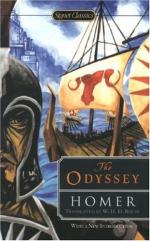And the ghost of Amphimedon answered, “Agamemnon, son of Atreus, king of men, I remember everything that you have said, and will tell you fully and accurately about the way in which our end was brought about. Ulysses had been long gone, and we were courting his wife, who did not say point blank that she would not marry, nor yet bring matters to an end, for she meant to compass our destruction: this, then, was the trick she played us. She set up a great tambour frame in her room and began to work on an enormous piece of fine needlework. ‘Sweethearts,’ said she, ’Ulysses is indeed dead, still, do not press me to marry again immediately; wait—for I would not have my skill in needlework perish unrecorded—till I have completed a pall for the hero Laertes, against the time when death shall take him. He is very rich, and the women of the place will talk if he is laid out without a pall.’ This is what she said, and we assented; whereupon we could see her working upon her great web all day long, but at night she would unpick the stitches again by torchlight. She fooled us in this way for three years without our finding it out, but as time wore on and she was now in her fourth year, in the waning of moons and many days had been accomplished, one of her maids who knew what she was doing told us, and we caught her in the act of undoing her work, so she had to finish it whether she would or no; and when she showed us the robe she had made, after she had had it washed, {186} its splendour was as that of the sun or moon.
“Then some malicious god conveyed Ulysses to the upland farm where his swineherd lives. Thither presently came also his son, returning from a voyage to Pylos, and the two came to the town when they had hatched their plot for our destruction. Telemachus came first, and then after him, accompanied by the swineherd, came Ulysses, clad in rags and leaning on a staff as though he were some miserable old beggar. He came so unexpectedly that none of us knew him, not even the older ones among us, and we reviled him and threw things at him. He endured both being struck and insulted without a word, though he was in his own house; but when the will of Aegis-bearing Jove inspired him, he and Telemachus took the armour and hid it in an inner chamber, bolting the doors behind them. Then he cunningly made his wife offer his bow and a quantity of iron to be contended for by us ill-fated suitors; and this was the beginning of our end, for not one of us could string the bow—nor nearly do so. When it was about to reach the hands of Ulysses, we all of us shouted out that it should not be given him, no matter what he might say, but Telemachus insisted on his having it. When he had got it in his hands he strung it with ease and sent his arrow through the iron. Then he stood on the floor of the cloister and poured his arrows on the ground, glaring fiercely about him. First he killed Antinous, and then, aiming straight before him, he let fly his deadly darts and they fell




